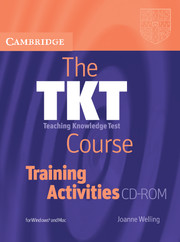1.5 - Subskills snakes and ladders
Published online by Cambridge University Press: 09 February 2024
Summary
Trainees can usually name the four skills really easily, but have trouble naming subskills precisely. This activity addresses this by featuring many examples of subskills in learners’ real-life contexts.
Instructions
1. Divide the class into groups of four to six trainees.
2. Explain/demonstrate how to play the game. (These instructions are rich in game-playing language so you may wish to highlight the italicised words and have trainees make a record of them.)
• Each player takes it in turns to roll the dice and move their counter the correct number of spaces along the board.
• Every time they land on a skills square (marked READING, WRITING, LISTENING or SPEAKING) the player opposite picks a card from the corresponding pile and reads the scenario (but not the answer!) out loud to them.
• The player whose turn it is must say which subskill or strategy is being used. The player who read the card checks this against the answer on the card. In case of any debate, the team should call on the trainer to act as referee.
• If the subskill named is correct, the player may go up the ladder or remain at the head of the snake. If the subskill named is incorrect, or if the player doesn't know, he must remain at the foot of the ladder or slide down to the tail of the snake.
• The reader then returns the card to the bottom of the pile and it is the next player's turn.
• The winner is the first player to land on the ‘finish’ square.
3. Circulate, monitor, arbitrate or encourage debate where required, and note down any areas of difficulty.
4. At the end of the game, lead feedback, asking what trainees have learnt from the activity and clarifying any points of difficulty.
NB Trainees with a B1 level of language may need some vocabulary support. Consider having mixed language level groups, and be ready to answer queries.
Variation
For a less challenging game, begin with a review of skills and subskills, and write all the subskills on the board. When the trainees play the game, they can refer to the list on the board to help them make their choice.
- Type
- Chapter
- Information
- The TKT Course Training Activities , pp. 21 - 25Publisher: Cambridge University PressFirst published in: 2024

